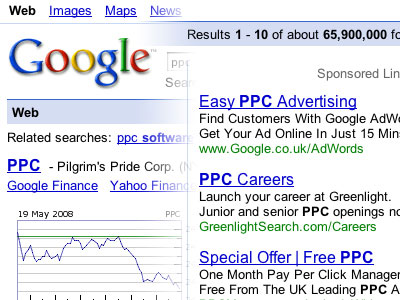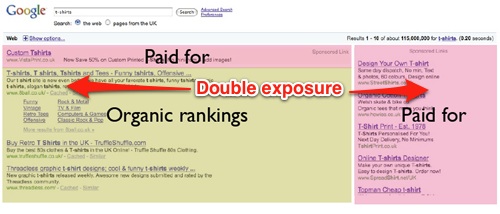I original wrote the makings of this post in a discussion on the ‘Yorkshire Mafia LinkedIn group‘ in response to a question about ‘Why bother with pay per click advertising on Google?’ I wanted to share this with you my readers and demystify people’s opinions of pay per click advertising or (PPC) for short.
In 2009 in the UK, paid for search accounted for 60.7% of online adverting spend. Display and Classifieds accounted for 20% and 19.1% respectively. – IAB/PwC 2009 UK Online Adspend Study, April 2010
That’s a really high percentage of online advertising spent on pay per click and it is obviously working for a large percentage of businesses in the UK.
The Benefits to Using Pay Per Click

A great benefit to (Pay Per Click) PPC, is the opportunity for testing. The speed and the amount of traffic that your website receives can be a good way to test whether a product or service has solid demand.
It also can help you to understand which keywords actually drive traffic & enquiries/ sales to your business. This understanding can then be applied to improving the search engine optimisation (SEO) to your website to obtain organic rankings for those keywords that you know already work!
This is information that you can get without any additional cost, thanks Google. Remember, that PPC is completely measurable so it is easy to see whether your PPC cost is actually generating positive effects on your sales through your website.
Yes, there is Google Adwords, BUT…Facebook Advertising also works on a pay per click model. Which business can avoid to miss targeting 500 million potential Facebook members Worldwide? You tell me!
In order to improve your cost per conversion, you should build targeted landing pages for your products and services to direct the adverts to. Test what works best for you, don’t point everyone directly to the homepage. If you do, the visitor then has to work hard to find your products, services or phone number.
Not every single website has an authority in Google, especially if that website is brand new. For the short-term goals whilst you work hard on establishing an authority in Google, pay per click can be used to generate sales from targeted keywords in the sponsored results. This gives businesses a chance to make sales and invest some profit back into improving their organic search engine rankings or other areas of online marketing.
Another benefit of pay per click is a high placement on natural search and having your company also in the sponsored ads which will give you higher clicks.

This happens because you have increased brand awareness in the search engine results. People see your company name not only in the organic search results, but also in the sponsored listings. Even if online users do not click on your ad straight away, they will most likely notice it and remember your company in the resulting pages.
A Story about a Man Called Jeff

I’d like to tell you a quick story about PPC, there once was a man called Jeff, Jeff believe himself to be quite a savvy business man who understood about the benefits of using technology.
The problem was, Jeff didn’t understand what each tool was specifically for. Jeff invested large sums of his money into pay per click with the aim of driving lots of traffic and exposure to his new website but….forgot to measure his return! For Jeff his sales did increase, but he was spending hundreds of pounds a day just to get them!
What Jeff didn’t calculate was the cost of this traffic vs. his sales profit. Unfortunately for Jeff, this figure didn’t quite match and he finally knew he had wasted his money.
The moral of this story is that Jeff didn’t understand that pay per click is primarily a short-term lead generation tool and that he should not have used it to solely drive lots of traffic to his website.
Had Jeff invested his £100 a day wisely into search engine optimisation, improving his search engine authority by link building, doing social media marketing or improving the content of his website, then Jeff would be have been a very rich man. He could have had the same amount of sales cheaper, by spending his money more wisely.
*Note this story is based on a true story. Jeff’s name has been protected to spare his identity. That picture isn’t really a picture of Jeff!
Smartdog’s Key Top 3 Tips for PPC:

- Don’t just get involved in Google Adwords or Facebook advertising with no prior experience or without learning about the advertising tools. It can be a complete MONEY PIT for businesses who don’t understand how to use it effectively. I have seen many businesses who have come to me after setting themselves budgets of £200 + a day and have not setup correctly anyway to measure this investment.
- You should speak to someone who understands the advertising channel and can help you get setup properly with Google Adwords.
- You will also want to understand how that traffic is performing, Google Adwords lets you setup tracking to measure your cost per conversion on a lead or sale and you can analysis this further by linking your account to your Google Analytics to understand the website traffic.
Remember, Paid traffic is getting more expensive year on year. There are other ways to generate traffic more cost effectively. E.g. through social media & or through SEO. However, to increase sales of a new product launch or to get some initial sales before you start ranking for keywords then pay per click is a fantastic tool!
By the way, whoever said traffic was FREE was lying, it is not. If you spend time updating your content to improve your SEO rankings, your time isn’t free, nor is it free when getting involved in social media. Your time is never FREE.
It’s all about monitoring your ROI from your online marketing! Most of all enjoy it, technology makes it even easier and cheaper for all of us to get new customers and more traffic to our websites. Yippee!
Google PPC Image: Flickr Photo Credit By Edgeworks Limited
Photo of Jeff: Flickr Photo Credit By CarbonNYC David Goehring

